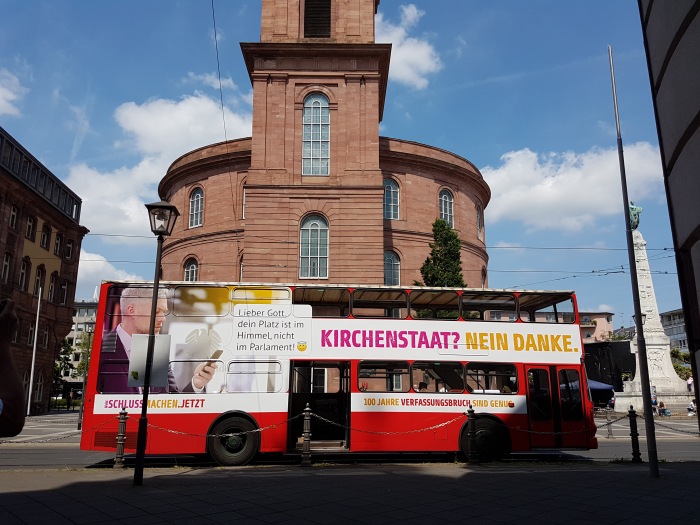"Germany is a Democratic, Social and Worldview Neutral Federal State"
Giordano Bruno Stiftung calls for extension of Article 20 of the German Basic Law

kampagne_paulskirche.jpg
Secular Bus Campaign in front of the Frankfurt Paulskirche
The Federal Constitutional Court already pointed out in the 1960s that the state can only be a "home of all citizens" if it adheres to the principle of worldview neutrality. The Giordano Bruno Stiftung therefore calls for a corresponding clarification in Article 20 of the German Basic Law. In the future, the article must not only mention the principles of democracy, the welfare state, and federalism, but also the principle of the worldview neutrality of the state.
"Only a state that does not privilege or discriminate against anyone on the basis of their religious or non-religious worldview can guarantee the freedom and equality of all citizens and thus adherence to human rights," explains Michael Schmidt-Salomon, philosopher and spokesman of the board of the Giordano Bruno Stiftung. "We can consider ourselves fortunate that the principle of the worldview neutrality of the state is enshrined so solidly in the German constitution, for example in Articles 1 to 4 and Article 140 of the German Basic Law. Unfortunately, however, this requirement of neutrality has not yet been explicitly mentioned in the constitutional text, with the result that, despite its fundamental significance for the rule of law, it is often overlooked".
For this reason, the Giordano Bruno Stiftung calls for Article 20(1) of the German Basic Law to be amended accordingly. Instead of: "The Federal Republic of Germany is a democratic and social federal state," the suggestion by the foundation states: "The Federal Republic of Germany is a democratic, social, and worldview neutral federal state". "Such an extension of the wording of Article 20 would not change the orientation of the Basic Law in terms of content, but it could perhaps prevent politicians from continuing to pass laws that violate the principle of neutrality by privileging religious beliefs," says Schmidt-Salomon, who in this context refers e.g. to the German legislation on abortion (§§ 218-219a of the German Criminal Code) and on assisted dying (§217 of the German Criminal Code).
The state may be "social", but not "Christian
The extent to which the principle of neutrality is ignored in everyday political life is demonstrated by a speech on artificial intelligence given by Federal Education Minister Anja Karliczek in February 2019. She said: "We let ourselves be guided by our Christian image of man. Every technological advancement has to follow suit." After the "heute-show" had mocked the Minister of Education's misguidance, FAZ editor Thomas Thiele tried to justify the Minister's controversial statement by saying that Karliczek was a representative of a "C-party" and that "a Social Democratic Minister of Education would not have been taken amiss if she had announced that she would shape the use of Artificial Intelligence socially".
Even though this argument may sound plausible at first, it diametrically violates the provisions of the constitution, Michael Schmidt-Salomon explains: "Apparently, the FAZ editor was not at all aware that the Federal Republic of Germany is a social, but not a Christian federal state! Therefore state regulations can in fact be perfectly justified with the welfare state principle, but never with Christianity! Unfortunately, we often encounter this error in politics, the judiciary, and the media. Therefore, it seems necessary to us to give the imperative of worldview neutrality, which has so far only been implicitly anchored in the constitution, the importance it deserves by explicitly mentioning it in Article 20 of the German Basic Law. Because: Only a state that acts as an impartial arbitrator on the playing field of religions and worldviews, i.e. a state that does not favour or disadvantage anyone, has the necessary credibility to enforce the rules of the game that apply to everyone. The principle is very simple: Anyone not wanting Muslims to override fundamental rights must not allow Christians to do so either."
Basic Law and Secular Bus Campaign
According to Schmidt-Salomon, most people are not familiar with the principle of worldview neutrality at all, nor do they know how important it is to guarantee the freedom and equality of all citizens. This had been shown by many conversations within the framework of the Secular Bus Campaign, which is currently touring through Germany in order to promote the consistent separation of state and religion. On May 22, the campaign will stop in Karlsruhe to celebrate the 70th anniversary of the German Basic Law at the site of the Federal Constitutional Court.
It is no coincidence that the bus campaign will be visiting Karlsruhe on Wednesday at the same time as Federal President Frank-Walter Steinmeier. The anniversary of the constitution was a decisive reason for conducting the Secular Bus Campaign in May 2019 in the first place, as foundation spokesman Michael Schmidt-Salomon reveals: "In 1949 Germany was fortunate enough to be able to incorporate substantial parts of the UN Declaration on Human Rights, adopted in 1948, into its constitution. The German Basic Law was therefore not only ahead of its time, it is even ahead of our time! In fact, the understanding of the state of not just a few representatives of politics, the judiciary, and the media still falls hopelessly behind the constitution, especially with regard to the enforcement of the freedom and equality of all citizens regardless of their religion or worldview. Therefore, there is still a lot of educational work to be done in this area – and we would like to make a small, modest contribution with the Secular Bus Campaign...".
